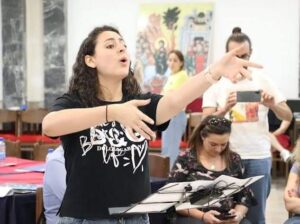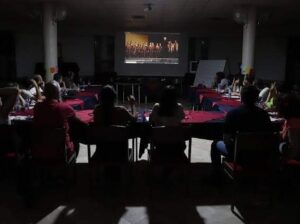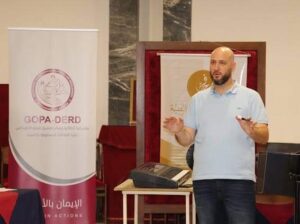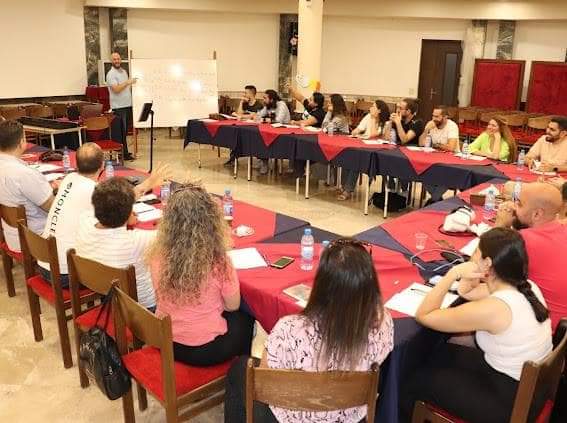“When we breathe, our singers breathe with us. When we smile, they smile back. When we stand well, so do our singers,” said James Davey, a renowned choral conductor and vocal coach. This sentiment perfectly encapsulates the spirit of the workshop “Choir Conducting Workshop”, where participants learned not just the technicalities of conducting, but also the art of inspiring and leading a choir.
In a land where the echoes of history blend with the melodies of resilience, Al-Nahda Art Association, in collaboration with the Department of Ecumenical Relations and Development (DERD) of the Greek Orthodox Patriarchate of Antioch and All the East (GOPA), orchestrated an unforgettable symphony of learning and camaraderie.
This was no ordinary workshop; it was an intensive journey into the art of choir conducting, designed to transform 21 talented musicians into maestros of harmony.
Under the expert guidance of Maestro Nady Muna, participants delved into essential conducting techniques, including posture, cues, preparatory gestures, and effective use of microphones. They also learned how to integrate musical instruments with the choir and practiced conducting in various musical styles. Maestro Muna, who has been involved in choral and musical projects for almost a decade, emphasized the importance of organizational skills in leading successful musical projects. His extensive experience as the musical director and general manager of Mosaica Academy provided invaluable insights to the participants.
Maestro Muna introduced the participants to a variety of conducting techniques. They practiced basic and advanced conducting patterns, learning specific hand patterns to indicate the tempo and beat for different time signatures, they explored patterns that feel natural to the music, such as grouping beats into twos or threes. “Communication skills are absolutely vital for any conductor.
 Being able to clearly convey your vision and instructions to the choir is crucial for effective rehearsals and performances,” Maestro Muna explained. “Additionally, a conductor should have strong interpersonal skills to build rapport and trust with choir members. Leadership skills are essential to inspire and guide the choir effectively. Creativity is also important, as it allows the conductor to bring fresh ideas and approaches to the music.”
Being able to clearly convey your vision and instructions to the choir is crucial for effective rehearsals and performances,” Maestro Muna explained. “Additionally, a conductor should have strong interpersonal skills to build rapport and trust with choir members. Leadership skills are essential to inspire and guide the choir effectively. Creativity is also important, as it allows the conductor to bring fresh ideas and approaches to the music.”
Participants also learned about cues and cut-offs, mastering the art of giving clear cues for when different sections of the choir should start and stop singing. They practiced using hand gestures to indicate changes in volume (crescendo, decrescendo) and expression (legato, staccato). Maestro Muna emphasized the importance of good posture and clear, confident gestures to convey the conductor’s intentions to the choir. He also highlighted the role of facial expressions in communicating emotions and dynamics, helping to inspire the choir.
“The diversity of the participants’ backgrounds was one of the main challenges,” Maestro Mouna noted. “We had conductors for adult choirs, children’s choirs, church choirs, Byzantine choirs, volunteer choirs with hobbyists, and even civilian choirs. This variation made the training more complex, as I had to balance and tailor the training to meet the specific needs of each group. However, this diversity also enriched the workshop, as participants could learn from each other’s experiences and perspectives. As Vera Nazarian, an acclaimed author, once said, “A choir is made up of many voices, including yours and mine. If one by one all go silent then all that will be left are the soloists. Don’t let a loud few determine the nature of the sound. It makes for poor harmony and diminishes the song.” It emphasizes the importance of every individual’s voice in creating a harmonious and balanced community. Each person’s contribution is valuable, and when everyone participates, it creates a richer and more diverse experience. This workshop was a testament to the power of many voices coming together to create something beautiful.
The workshop also fostered networking among music conductors, aiming to build a strong community of professionals in this field. Safana Baqleh, a prominent member of the organizing committee of Alnahda Art Association and conductor of the Gardenia Choir, the first female polyphonic choir in Syria and the region, aiming to promote the values of peace and social forgiveness within the war-ravaged Syrian society, highlighted the significance of such initiatives.
 “The Nahda Art Association has been focusing on empowering and building skills for musicians in Syria, especially given the challenging circumstances we face due to sanctions and limited mobility,” she explained. “Providing training opportunities within the country is crucial for helping musicians gain new skills and advance in their professional careers. Before this choir conducting workshop, we organized a lyric writing workshop. Both workshops aim to train musicians and give them the opportunity to evolve and excel in their fields.”
“The Nahda Art Association has been focusing on empowering and building skills for musicians in Syria, especially given the challenging circumstances we face due to sanctions and limited mobility,” she explained. “Providing training opportunities within the country is crucial for helping musicians gain new skills and advance in their professional careers. Before this choir conducting workshop, we organized a lyric writing workshop. Both workshops aim to train musicians and give them the opportunity to evolve and excel in their fields.”
Safana also stressed that the isolation throughout the past decade has made it difficult for Syrian musicians to learn new techniques and transfer them to new generations. The restricted conditions have left some behind others, but they have also fostered a spirit of innovation and a strong desire to learn. “The isolation has been a double-edged sword,” she noted. “While it has limited our access to new techniques and knowledge, it has also made us more innovative and eager to learn. This workshop is a testament to that resilience and determination.”
Judi Sleman, a flutist graduate of the Higher Institute of Music in Syria and a member of the Gardenia Choir, found the workshop to be a treasure trove of knowledge. “Although I am not yet a conductor, I have a strong passion for conducting and leadership. This workshop has been incredibly helpful in teaching me how to put together a timeline for rehearsals, communicate effectively with choir members, and manage the team dynamics. The skills and techniques I learned will definitely enhance my abilities and confidence, paving the way for me to become a conductor in the future,” she shared enthusiastically.
 Then there was Dr. Adeeb Kadamani, a surgeon by profession but a musician at heart. A graduate of the Sulhi Alwadi Institute for Music, Dr. Kadamani has spent a decade as a musical instructor and has been chanting in a choir for seven years. He marveled at the practical aspects of the workshop, saying, “The information provided displayed various conducting schools and techniques, but the practical part was the most valuable.” When asked about the common grounds between surgery and music, he chuckled and replied, “Both fields require synchronization, accuracy, and the capability to work skillfully with one’s hands. Whether performing surgery or conducting music, precision and coordination are essential.”
Then there was Dr. Adeeb Kadamani, a surgeon by profession but a musician at heart. A graduate of the Sulhi Alwadi Institute for Music, Dr. Kadamani has spent a decade as a musical instructor and has been chanting in a choir for seven years. He marveled at the practical aspects of the workshop, saying, “The information provided displayed various conducting schools and techniques, but the practical part was the most valuable.” When asked about the common grounds between surgery and music, he chuckled and replied, “Both fields require synchronization, accuracy, and the capability to work skillfully with one’s hands. Whether performing surgery or conducting music, precision and coordination are essential.”
The workshop was not just about learning; it was about building a community. Participants from diverse backgrounds—conductors for adult choirs, children’s choirs, church choirs, and civilian choirs—came together, sharing their experiences and perspectives. This melting pot of ideas and cultures enriched the workshop, making it a truly unique experience.
As the final notes of the workshop faded, the participants expressed their gratitude for the opportunity to learn from Maestro Mouna and to network with other conductors. The skills and knowledge gained during this intensive training will undoubtedly enhance the quality of choral conducting and vocal ensemble management within their respective projects. The support from DERD and Al-Nahda Art Association was instrumental in making this workshop a success.
In the words of Maestro Mouna, “Together, we have made this workshop a success, and I look forward to more such events in the future.” With hearts full of harmony and minds brimming with new knowledge, the participants left, ready to spread the magic of music across Syria.
This workshop was not just about conducting; it was about creating a harmonious community through the universal language of music, emphasizing the importance of cooperation and organization in developing a deep appreciation for beauty and quality within a community. As Edgard Varese, a pioneering composer, aptly captured, “Of all the arts, music is the one communal art. It requires for its existence extensive cooperation and organization… Singing together the greatest choral music of all time is the surest way of developing in a community that sense of quality and reverence for beauty, which is the basis of a musical culture.”
Lama Alhassanieh

